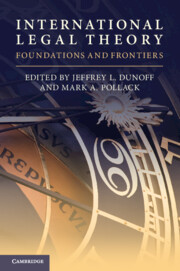Book contents
- International Legal Theory
- Reviews
- International Legal Theory
- Copyright page
- Contents
- Contributors
- Acknowledgments
- Part I Introduction: Setting the Stage
- Part II Traditional Approaches to International Law
- Part III Critical Approaches to International Law
- Part IV Post–Cold War Approaches to International Law
- 9 Global Administrative Law
- 10 Constitutionalism As Theory
- 11 Global Legal Pluralism
- Part V Interdisciplinary Approaches to International Law
- Part VI International Law: Dialogue and Dialectic
- Index
10 - Constitutionalism As Theory
from Part IV - Post–Cold War Approaches to International Law
Published online by Cambridge University Press: 21 July 2022
- International Legal Theory
- Reviews
- International Legal Theory
- Copyright page
- Contents
- Contributors
- Acknowledgments
- Part I Introduction: Setting the Stage
- Part II Traditional Approaches to International Law
- Part III Critical Approaches to International Law
- Part IV Post–Cold War Approaches to International Law
- 9 Global Administrative Law
- 10 Constitutionalism As Theory
- 11 Global Legal Pluralism
- Part V Interdisciplinary Approaches to International Law
- Part VI International Law: Dialogue and Dialectic
- Index
Summary
Amongst international lawyers, the approach to international law often labelled constitutionalism properly emerged at some point in the late 1990s, perhaps mostly inspired by millenarian anxieties. A short century after Oswald Spengler declared the decline of the West, and three quarters of a century after José Ortega y Gasset bemoaned the revolt of the masses marking the end of civilization, some international lawyers expressed concern about the survival of mankind, and proposed that only a reconstructed international law could come to the rescue – and quite a few of these international lawyers hailed from Germany.
This was curious, or so it seemed. The West, far from declining, had just triumphed over the East in the beginning of the 1990s. Western values (typically those endorsed by constitutionalist international lawyers) had already assumed prominence, so much so that Francis Fukuyama could famously proclaim the end of history, inspired by Germany’s national philosopher G. W. F. Hegel. And Germany itself had just been reunited (or united, as the case may be – these matters are politically sensitive).
- Type
- Chapter
- Information
- International Legal TheoryFoundations and Frontiers, pp. 220 - 239Publisher: Cambridge University PressPrint publication year: 2022
- 1
- Cited by

